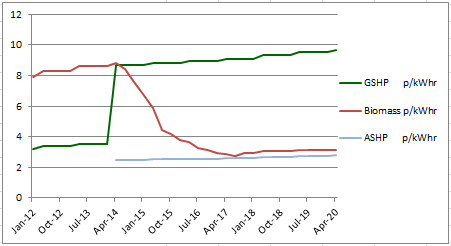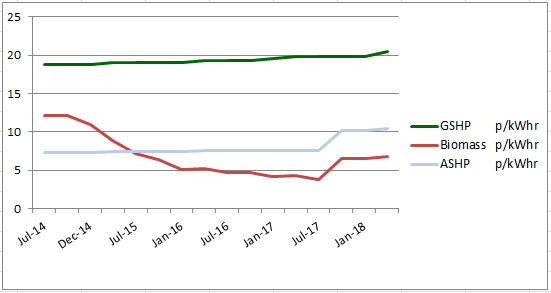BEIS
The BEIS section of the GOV.UK website publishes information on the RHI and other matters.
Degression of Commercial RHI for biomass
BEIS has adopted a mechanism for budget management of RHI payments which involves "degression" of tariff rates for technologies that are absorbing more cash from the RHI budget than BEIS had envisaged.
This has led to dramatic degressions of the RHI tariffs for biomass boilers – as shown on the graph in red.
The tariffs for GSHPs started at a very low level until increased sharply in 2014 – as shown on the graph in green.
The first degression was a 5% reduction in the tariff for medium biomass from 1 July 2013.
The second degression was a 5% reduction in the tariff for small biomass from 1 July 2014.
The third degression was a 10% reduction in the tariff for small biomass from 1 October 2014.
The fourth degression was a 10% reduction in the tariff for small biomass from 1 January 2015.
The fifth degression was a 15% reduction in the tariff for small biomass from 1 April 2015.
The sixth degression was a 25% reduction in the tariff for small biomass from 1 July 2015.
The seventh degression was a 5% reduction in the tariff for small biomass from 1 October 2015.
The eighth degression was a 10% reduction in the tariff for small biomass from 1 January 2016.
The ninth degression was a 5% reduction in the tariff for small biomass from 1 April 2016.
The tenth degression was a 10% reduction in the tariff for small biomass from 1 July 2016.
The eleventh degression was a 5% reduction in the tariff for small biomass from 1 Oct 2016.
The twelfth degression was a 5% reduction in the tariff for small biomass from 1 January 2017.
The thirteenth degression was a 5% reduction in the tariff for biomass from 1 April 2017.
The fourteenth degression was a 5% reduction in the tariff for biomass from 1 July 2017.
BEIS's policy for degression is explained here.
Degression of Domestic RHI for biomass
The first Domestic RHI degression was a 10% reduction in the tariff for biomass from 12.2p to 10.98p from 1 January 2015.
The second was a 20% reduction in the tariff for biomass from 10.98p to 8.93p from 1 April 2015.
The third was a 20% reduction in the tariff for biomass from 8.93 to 7.14p from 1 July 2015.
The fourth was a 10% reduction in the biomass tariff from 7.14 to 6.43p from 1 October 2015.
The fifth is a 10% reduction in the biomass tariff from 6.43 to 5.14p from 1 January 2016.
The sixth is a 10% reduction in the biomass tariff from 5.14 to 4.68p from 1 July 2016.
The seventh is a 10% reduction in the biomass tariff from 4.68 to 4.21 from 1 January 2017.
BEIS overuled its degression policy in Dec 2016 and fixed the biomass rate at 6.44 from 1 Jan 2017.
The eighth is a 10% reduction in the biomass tariff from 4.28 to 3.85 from 1 July 2017.
None of the other technologies are at risk of degression as the uptake of GSHPs and solar thermal panels is only a small fraction of what DECC had anticipated.
The tariff for GSHP at 19.86p is now more than three times that for biomass.
RHI accreditation statistics from Ofgem
RHI accreditation statistics from Ofgem.
Experienced Contractor
A ground source heat pump provides an excellent method for providing emission free heating and avoiding further rises in energy bills, as well as attracting RHI, but they must be installed by an experienced contractor for the full potential to be realised.
Please verify if your contractor is a member of the HP Federation.

